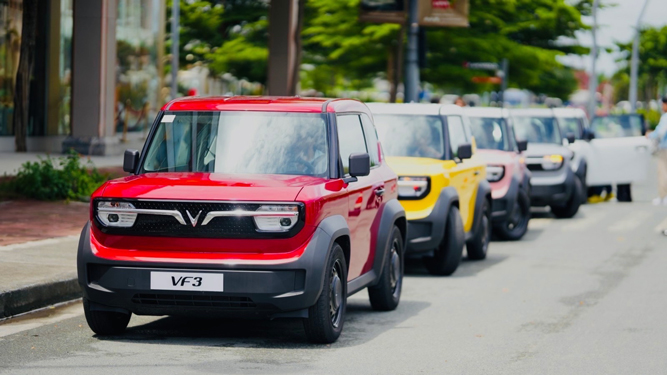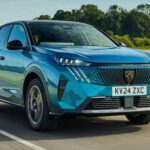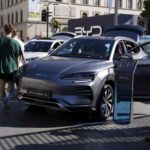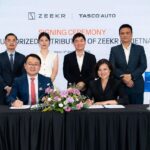Ambitious Goals
The draft sets out ambitious targets for Vietnam’s automobile industry. By 2030, it aims to achieve an average market growth rate of 14%-16% per year, with a purchasing power of 1-1.1 million vehicles per year. Green vehicles are expected to account for 18%-22% of this total. In terms of domestic production and assembly, the industry targets an annual growth rate of 18%-20%, aiming to produce 600,000-700,000 vehicles by 2030.

The Ministry of Industry and Trade aims to prioritize policies that encourage the development of electric vehicles and environmentally friendly fuel vehicles. Photo: VINFAST
For the period of 2031-2045, the overall market growth target is set at 11%-12% per year, with a consumption of 5-5.7 million vehicles annually. Electric vehicles and those using other forms of clean energy are expected to make up 80%-85% of this total. Domestic vehicle production is projected to grow by 13%-14% per year during this period, reaching 4-4.6 million vehicles annually, which would meet 80%-85% of domestic demand. Notably, the draft decision aims for a localization rate of 55%-60% for auto parts and components by 2030, increasing to 80%-85% by 2045.
Experts agree that Vietnam’s automobile market has significant growth potential in the 2024-2030 period. This is based on the country’s entry into the “motorization” phase, with a per capita vehicle ownership rate of over 50 cars per 1,000 people in 2023. However, automobile expert Nguyen Minh Dong emphasizes that to achieve true “motorization,” investments in traffic infrastructure, charging stations, power sources, parking lots, etc., must be made in advance to avoid traffic congestion in major cities and power shortages in rural areas.
A representative from an automobile enterprise shared the view that the realization of the goals set out in the draft decision largely depends on supportive policies. Countries in the region, such as Indonesia and Thailand, have successfully implemented their “motorization” strategies within a few years thanks to substantial government support.
The managing agency, the Ministry of Industry and Trade, acknowledges that Vietnam’s automobile industry is still modest in scale compared to its regional peers, both in terms of market size and production volume. In 2023, Vietnam’s automobile market reached approximately 302,000 vehicles, while Thailand and Indonesia boasted markets of 759,000 and 887,000 vehicles, respectively. The country’s supporting industries can only supply simple and bulky component assemblies, such as seat frames, batteries, and large plastic parts, limiting Vietnam to the role of an assembler with production costs 10%-20% higher than large manufacturers in Southeast Asia.
Special Incentives for Electric Vehicles
The draft decision emphasizes the need to develop policies that prioritize the production, assembly, and importation of electric vehicles and those using environmentally friendly fuels. This includes the development of related infrastructure, such as charging stations, fueling stations, transformers, traffic infrastructure, and power grids.
Additionally, the Ministry of Industry and Trade proposes market stimulus policies, including special consumption tax incentives, reduced registration fees for electric and hybrid vehicles, and support for consumer parking fees and environmental taxes. The Ministry also aims to develop and promote the supporting industries that supply components and parts for the production and assembly of electric, hybrid, solar-powered, biofuel, and other new green energy vehicles.
According to Mr. Dao Cong Quyet, Head of the Communication Subcommittee of the Vietnam Automobile Manufacturers’ Association (VAMA), increasing incentives and preferences for environmentally friendly vehicles through reduced special consumption taxes will support the market’s transition from internal combustion engine vehicles to pure electric vehicles. Therefore, VAMA recommends that the state consider reducing the special consumption tax rate for hybrid vehicles from 100% to 70% of the rate applied to gasoline and diesel vehicles of the same type. The tax rate applied to PHEV (plug-in hybrid electric vehicles) should be 50% of the rate applied to gasoline and diesel vehicles of the same type, representing a further 20% reduction from the current rate.
VAMA also proposes maintaining the current special consumption tax rates for double-cab pickup trucks, which range from 15% to 25% depending on engine displacement. This is justified by VAMA representatives as a consideration for customers in difficult regions who require such vehicles due to their affordability and suitability for local terrain.
Mr. Nguyen Manh Cuong, Chairman of the Board of Directors of Ever EV, a company specializing in the distribution, operation, and maintenance of electric vehicle charging systems, suggests that electricity prices for charging stations should be set according to the rates for production rather than business customers.
Mr. Cuong points out the challenges faced in developing electric vehicle charging stations, including the lack of planning for power sources and land use. He recommends reviewing and supplementing potential locations for constructing charging stations, including all buildings, residential areas, and rest stops on highways, with simplified procedures to avoid overlap.
Need for a Roadmap to Tighten Emission Standards
Dr. Ha Huy Ngoc from the Vietnam Economics Institute shared the example of China, which provided significant incentives and subsidies for the production and adoption of new energy vehicles, as well as the production and installation of charging stations during the early stages of market development. However, as the market matured, these incentives were gradually reduced from 2020 onwards. Therefore, Vietnam needs to concretize and implement solutions and policies that encourage domestic consumption and production while also establishing a roadmap to tighten emission standards for vehicles.
The Race to Electrify: Traditional Taxi Giant Rumored to Follow in Vinasun and Mai Linh’s Footsteps with Hybrid Fleet
A renowned taxi brand is about to introduce the Haval H6 HEV to its fleet. This sleek and modern SUV promises a comfortable and efficient ride for passengers. With a focus on sustainability and innovation, the H6 HEV is a welcome addition to the company’s commitment to providing reliable and eco-friendly transportation options.
“Tasco Auto: Now Official Distributors of Premium Electric Car Brand, Zeekr, in Vietnam.”
Zeekr, the premium electric vehicle brand under the Geely Holding Group, has entered into an official distribution agreement with Tasco Auto, Vietnam’s leading automobile distributor. This strategic move signifies Zeekr’s expansion plans in the Southeast Asian market and underscores Tasco Auto’s commitment to bringing premium electric vehicles with advanced technology and internationally-accredited service standards to Vietnamese consumers.










































